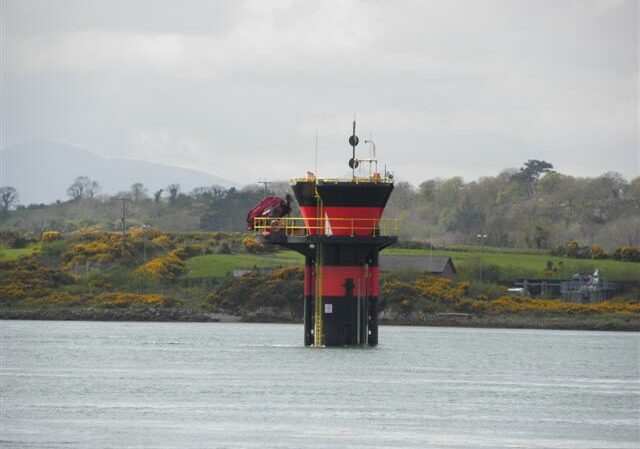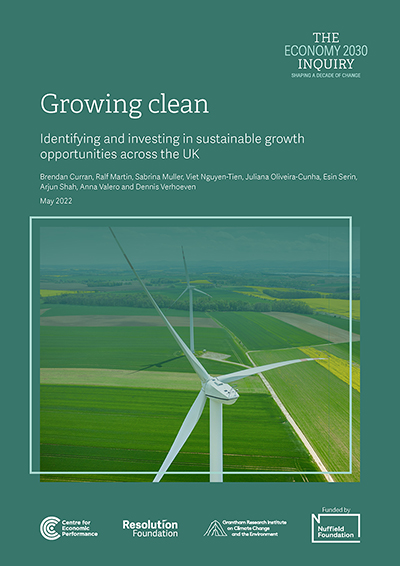Growing clean: Identifying and investing in sustainable growth opportunities

Download
Authors: Brendan Curran, Ralf Martin, Sabrina Muller, Viet Nguyen-Tien, Juliana Oliveira-Cunha, Esin Serin, Arjun Shah, Anna Valero and Dennis Verhoeven

Watch the launch event ‘Green growth: miracle or mirage? How might cutting-down carbon give the UK economy a cutting-edge?’ with Dame Julia King, Anna Valero, Mike Biddle and David Willetts here.
Growing clean is the 19th report for The Economy 2030 Inquiry, funded by the Nuffield Health Foundation. It examines how-well placed the UK is to make the required investments for a successful net-zero transition, and the wider economic impact those investments might have.
The report considers the UK’s pre-existing relative strengths in technologies, goods and services that are relevant for net-zero. It also undertakes a series of ‘deep dives’ into key areas in the UK’s decarbonisation process to investigate the extent of UK strengths that can be built upon to accelerate domestic deployment of related technologies as well as unlock export opportunities. Finally, it assesses how the UK’s financial sector can be oriented towards delivering the investment needed for net-zero, and for realising related opportunities in the UK. The focus is on innovators or firms creating technologies, products and services that are relevant for delivering net-zero and that can generate value in the UK.
Main messages
- Major economy-wide changes will be required over the next decade to make large-scale emissions reductions in the UK, and investment and innovation will be key to achieving this.
- These changes and investments will provide opportunities for cost savings via improved resource efficiency, growth via the development of new products and services to serve growing domestic and international markets, and broader co-benefits such as cleaner air and improved health.
- For the required innovation to happen at the necessary scale and pace, incentives, regulation, government spending and participation from civil society will be needed.
- Smart green investment does have the potential to generate growth in the UK, including in areas badly in need of more economic opportunities, but it is not a silver bullet to solve the UK’s wider economic challenges of low growth and high inequality.
- While the UK is not a green tech ‘superpower’, and there are other countries better placed to capitalise on areas of green growth, the UK does enjoy a comparative advantage over other advanced economies in several key technologies – notably tidal power, offshore wind and carbon capture and storage – as well as green finance, and government should focus on encouraging growth in these sectors.
- Areas outside London and the South East appear to be more specialised in goods or services relevant for net-zero within the high-growth economy.
- Regions characterised by lower productivity – such as Derbyshire and Nottinghamshire, Cornwall and the Isles of Scilly and Lincolnshire – appear to be relatively more specialised in clean technologies. These areas are likely to gain from the expansion of clean technologies that the UK already performs well at.
- As such, a successful net-zero investment strategy that targets these goods, technologies and services could play a key role in supporting the Government’s levelling-up strategy too.
- While the UK leads as a centre of green finance, it cannot expect the private sector alone to provide the scale of investment required by its net-zero ambitions.
- Emerging technologies with high growth potential can benefit from the fact that the UK is well-placed as a hub of venture capital investment, ranking first in Europe. However, the share of clean tech in this investment needs to grow significantly.
- Smart public investment targeted at areas of clean technology where the UK already enjoys advantages over its competitors will be key to growth.
Growing Clean is a collaboration between the Resolution Foundation and LSE (Grantham Research Institute and Centre for Economic Performance).

